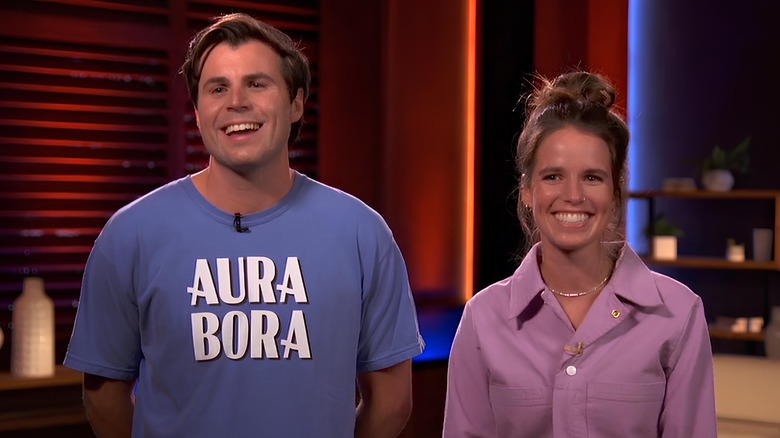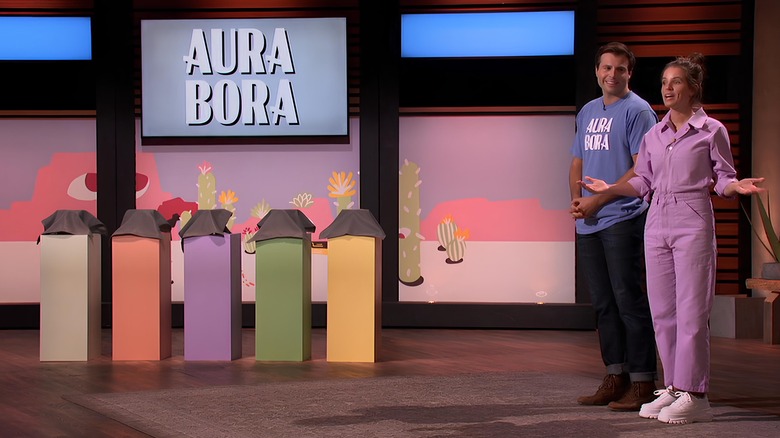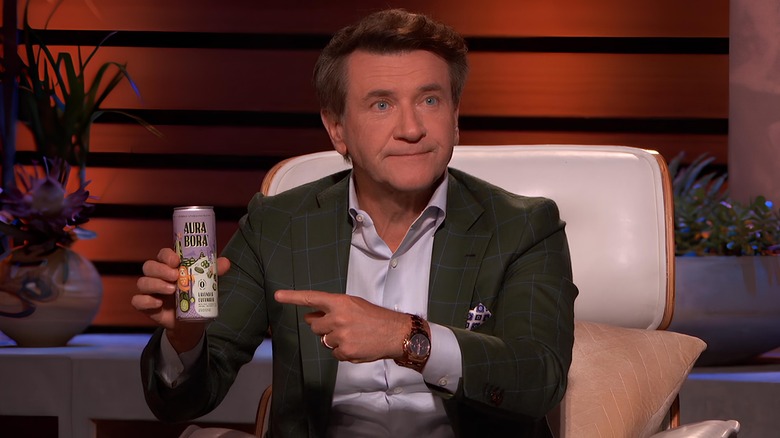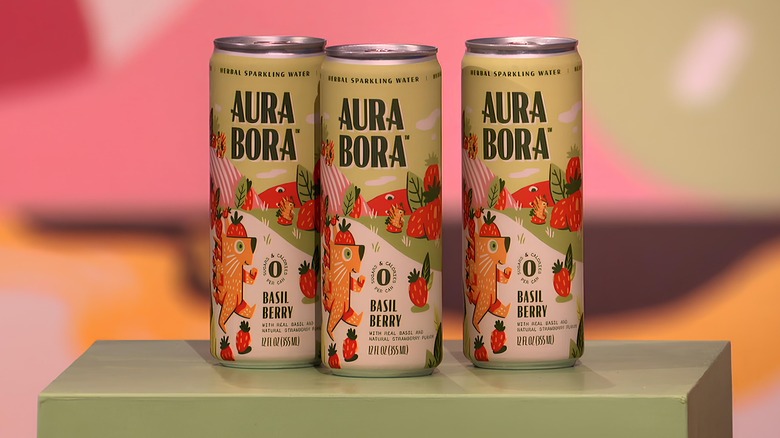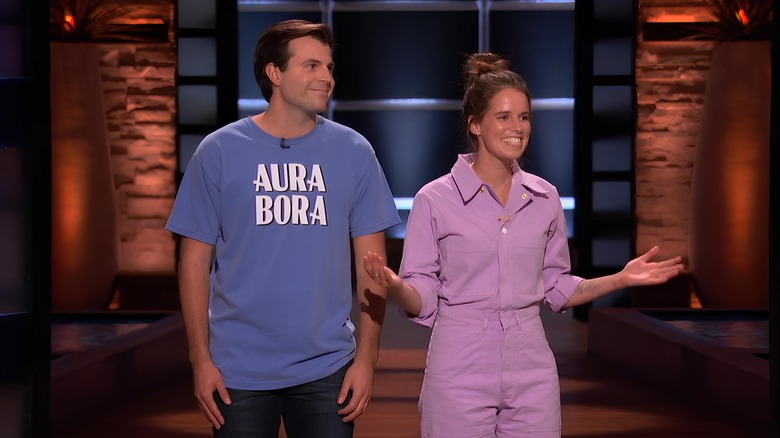Whatever Happened To Aura Bora After Shark Tank?
For many seltzer drinkers, the bubbly beverages began as a second-tier soda replacement — all the fizz without the sugar. That was certainly the case for the husband-and-wife team behind Aura Bora, Paul and Maddie Voge. "Our love of sparkling water as adults came from having crunchy moms as kids who wouldn't let us drink soda," Maddie told Business Insider. "But we didn't enjoy many of the sparkling water flavors available, so we started to make our own at home."
The couple started tinkering in their kitchen in early 2019, combining sparkling water with more unusual flavor combinations than are typically available at the grocery store. "As soon as we muddled crushed fresh basil and frozen strawberries with carbonated water," Maddie continued, "we knew we'd hit something interesting."
In October 2019, the pair launched their first 1,000 cans of Aura Bora to a test market in five different flavors, utilizing untapped ingredients like herbs and flowers. Paul left his job in the financial sector to run Aura Bora full time while Maddie worked as creative director on nights and weekends, spending her days working in branding at a tech firm. In April 2020, the "Shark Tank" producers reached out to the couple to see if they wanted to appear on the show.
Aura Bora sparkled on Shark Tank
Aura Bora's road to "Shark Tank" was unconventional but not unheard of; companies like Plufl and BuggyBeds had been sought out by the show's producers as well. It's unsurprising, given how quickly Aura Bora made a name for itself in the sparkling water market, an industry that was valued at $34.33 billion in 2022. Unlike other brands, Aura Bora claimed to be free of artificial sweeteners.
Upon making its "Shark Tank" debut in Season 12, Aura Bora had already netted $200,000 in sales and was projected to finish the following year at between $2.5 and $3.5 million. The beverages were already retailing at 488 stores with the capacity to scale its manufacturing up to ten times its current volume.
Paul and Maddie Voge appear in the tank bearing samples of their flagship flavors in the hopes of securing $150,000 for 5% equity: basil berry, cactus rose, peppermint watermelon, lemongrass coconut, and their top seller, lavender cucumber.
The Sharks are impressed, but not all of them are in love with the product. Lori Greiner and Mark Cuban both blanche at some of the flavors, and Daniel Lubetzky thinks the market is too niche. Kevin O'Leary makes an offered the couple their asking price, plus a 5¢ royalty until he makes back $300,000. After Robert Herjavec initially offers $150,000 for 12% equity, he ultimately makes a deal with the entrepreneurs for $200,000 for 15% equity.
Aura Bora is available in thousands of stores
On "Shark Tank," Robert Herjavec is pleasantly surprised that the drinks don't come off as another generic sparkling water brand. Moreover, he loves the lavender flavor. For their part, Paul and Maddie Voge are thrilled to partner with Herjavec. "Robert has a lot of experience in digital marketing," Paul says at the end of the "Shark Tank" segment. "He can help us build a direct-to-consumer digital beverage brand."
Aura Bora and Herjavec's deal went through behind the scenes, and the drink spread to more stores around the country. Aura Bora can now be bought in over 7,500 retail stores, including Whole Foods, Walmart, Wegmans, and Target. Aura Bora was also able to expand its operations, bringing in 13 employees whose responsibilities range from sales to graphic design to social media.
It helped that Aura Bora had secured funding before appearing on "Shark Tank." During their episode, the couple noted that they had raised $700,000 to date. At the time of filming, Paul and Maddie owned 74% of Aura Bora. Since "Shark Tank," they've acquired even more funding.
The weird water keeps on flowing
After making its "Shark Tank" debut, Aura Bora continued its meteoric rise in the beverage space. In 2021, the company received $2 million in seed funding, allowing it to restock the shelves at retailers like Whole Foods and Sprouts. The increased capital also enabled Maddie Voge to leave her day job and pivot to Aura Bora full-time. By 2022, the brand had received over $3 million in lifetime funding and earned a valuation of over $20 million. Its investors include the actor Scott Eastwood of "Fast X" fame and Thrive Market CEO Nick Green. For their efforts, Maddie and Paul made it onto Forbes' 30 Under 30 list in 2022.
Plenty of that funding went into the product itself, and since appearing on "Shark Tank," Aura Bora has launched a number of new "forever flavors," including ginger Meyer lemon and grapefruit elderflower. The brand also offers limited-edition and seasonal flavors like mango chili and peach honeysuckle. A bi-monthly "Flavor of the Month" service gives Aura Bora subscribers exclusive access to offbeat flavors like banana bergamot, allowing the brand to lean into its love of "weird water," as Paul put it on "Shark Tank." "I've always wanted to use bergamot but it hasn't worked in anything," he told ModernRetail. "If nothing else, it makes for a fun gag gift."
Still, it hasn't entirely been smooth sailing for the young company. In February 2021, the cold weather made some Aura Bora cans explode in transit, while others turned to seltzer slush. The company quickly implemented a shipping strategy that took cold temperatures into account.
What's next for Aura Bora?
Aura Bora may be known for its inventive, unconventional flavors, but its marketing strategy — namely the aforementioned secret menu and subscription service — has made it a singular digital brand that also happens to have a strong foundation in retail. It makes sense, then, that Aura Bora is beginning to collaborate with like-minded companies.
In September, Aura Bora launched a collaborative olive oil martini flavor with Graza, the direct-to-consumer olive oil brand that's taken the internet by storm. The non-alcoholic martini flavor blew up when it dropped in September, inspiring press from The Food Network, among other outlets, and plenty of reviews begging that the flavor be available in stores. According to an Aura Bora Instagram post, the drop spiked the website's sales by 815%.
The flavor came to fruition when Paul Voge and Graza's Andrew Benin met at a trade show and joked about a martini collab. "It started as a friendship, and it has culminated in a delicious product," the Aura Bora CEO told Food Business News. In addition to Graza's Extra Virgin Picual Olive Oil, the sparkling water contains juniper oil, yuzu extract, and zero-proof vermouth flavor. "It drinks like something that's designed for 6 p.m.," he continued.
It's not Aura Bora's first time experimenting with vegetal, savory flavors. Its Thanksgiving-inspired green bean casserole flavor similarly sparked an online reaction. With Aura Bora's digital branding savvy, the olive oil martini will surely inspire more collaborative products in the future.
